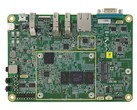The NanoPi R3S-LTS is a new single-board computer from FriendlyElec that is suitable for a variety of applications, but its features clearly suggest that it is designed for network applications. The model comes with a Rockchip RK3566 SoC, which has four Cortex-A55 computing cores and so is not a particularly high-performance SoC. Depending on the model variant selected, 1 or 2 GB of LPDDR4(X) RAM is installed. The NanoPi R3S-LTS can also be ordered with up to 32 GB of eMMC storage. As usual, a microSD card can be used for storage expansion.
With the corresponding housing, the model measures 62.5 x 62.5 millimeters and is 28 millimeters high. Two Ethernet ports are available for network connectivity, both of which support Gigabit speed. In addition to the two Ethernet ports on the back, there is also a HDMI and a USB-C port. The latter supplies energy to the board, but can also be used to connect to a PC, in which case an operating system can be installed conveniently via the web browser. According to the manufacturer, supported operating systems include FriendlyWrt, OpenMediaVolt and Ubuntu Noble Core, among others. In addition to the microSD slot and three LEDs, there is also a USB 3.2 Gen 1 port on the front.
The NanoPi R3S-LTS can be purchased directly from the manufacturer at a starting price of $25.



















